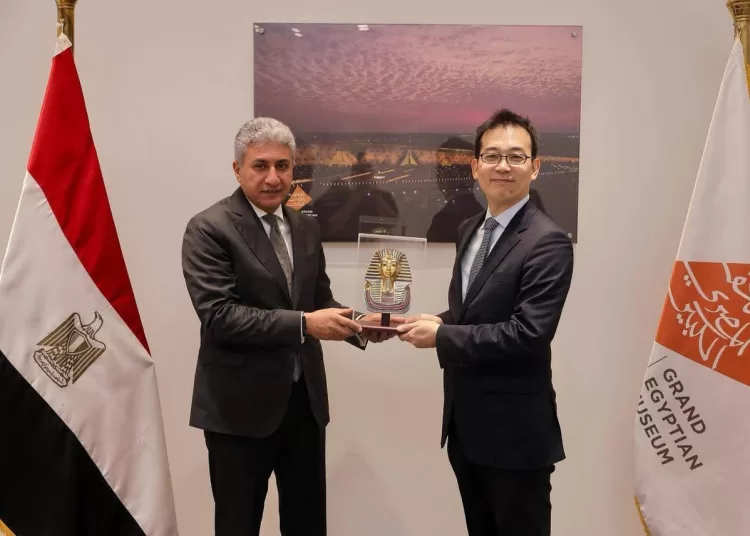Egypt and Japan are poised to carry on with decades-long links by boosting collaboration in various fields, ranging from the preservation of antiquities and education to tourism and cultural exchange. Recent high-profile visits and agreements between the two sides demonstrate an enduring commitment to a partnership founded on mutual respect, shared aspirations, and a dedication to sustainable development.
Minister of Tourism and Antiquities, Sherif Fathi, this week extended a warm welcome to Ebisawa Yo, the new head of the Japan International Cooperation Agency (JICA) office in Cairo. The meeting unfolded in the awe-inspiring setting of the Grand Egyptian Museum (GEM), a symbol of Egypt’s rich heritage and a milestone in Egyptian-Japanese cooperation.
The discussions focused on bolstering the long-standing partnership between the two nations, with emphasis on tourism, preserving antiquities, and improving professional capacities in archaeological work.
Minister Fathi praised the ongoing collaboration on the GEM — a project supported by Japan’s significant expertise and resources — saying it would become not only the largest museum of ancient Egyptian antiquities in the world but also a premier research center for Egyptology.
Fathi highlighted upcoming collaborations, including continued work on the GEM’s ambitious research strategy. Meanwhile, the scenic venue prepares to host cultural treasures like the “Ramses and the Gold of the Pharaohs” exhibition, which will open in Tokyo this March, further extending Egypt’s rich cultural stories to the Japanese people.
For his part, Ebisawa lauded the strides made at the museum, emphasizing JICA’s dedication to projects that promote cultural preservation. Discussions also touched on increasing Japanese tourist visits to Egypt and leveraging the latter’s expertise in archaeological restoration.
Japan’s commitment to preserving Egypt’s cultural landmarks extends to a recent $1.17 million grant for revitalizing the Cairo Opera House. The grant will fund infrastructure improvements and state-of-the-art equipment upgrades in key theatre facilities, enhancing the visitor experience and elevating Egypt’s cultural stage.
The overhaul of the Opera House reflects Egypt’s broader vision of cultivating creativity and innovation while celebrating its historical and artistic identity, hand in hand with a partner like Japan.
Japan and Egypt’s ties date back to 1954, spanning over 70 years of robust collaboration. These relations have flourished across a myriad of fields.
This strong partnership has also inspired collaboration in education, particularly through the introduction of the Japanese education model in select Egyptian schools.
The renowned Japanese website “go2senkyo,” a top source for election and political news, has recently highlighted statements by MP Hiroyuki Nakamura, Chair of the Education, Culture, Sports, Science, and Technology Committee in Japan’s Parliament. Nakamura underscored the importance of his meeting with Mohamed Abdel Latif, Egypt’s Minister of Education and Technical Education, during his recent visit to Japan.
The website also draws attention to Minister Abdel Latif’s strong interest in Japan’s educational practices, which have been incorporated into some Egyptian schools through unique educational activities.
MP Nakamura explained that Abdel Latif’s visit aimed to promote the integration of Japanese educational principles within Egypt’s public school system. He expressed hope that this model—emphasizing the development of social values in tandem with academic learning—could become a guiding example for educational advancement across Africa.





